Today’s ticketing industry is facing many challenges. A tough economy, declining event attendance and competing forces for the entertainment dollar, is causing the industry to re-evaluate alternative pricing structures that provide a fair-to-all solution for artists, promoters, primary ticket sellers, secondary ticket sellers and consumers. One of the most promising solutions to these issues is dynamic pricing.
Dynamic pricing refers to a fluid pricing scheme between the consumer and retailer. It implies the price of a product or service will change or fluctuate depending on different variables, conditions and situations. Industry analysts predict companies that provide efficient, cost-effective, customer-friendly pricing structures, such as dynamic pricing, will be able to overcome the struggles the ticketing industry is currently facing.
Dynamic Pricing 101
Dynamic pricing is the key to pricing for profits and growth in the ticket industry. While sophisticated pricing models are still a relatively new concept to the market, the impact that dynamic pricing can have on selling and purchasing behaviors is significant and can provide a fair-to-all solution for ticket sellers and consumers. Dynamic pricing is already prevalent in many industries including e-commerce and digital media.
It is important to make a differentiation between dynamic pricing and variable pricing. Variable pricing is the simple practice of presenting different prices to customers at different times based upon “proxies” that are somewhat arbitrary measures (e.g., popularity, special sales, tiers, etc.). Dynamic pricing which is much more accurate, is the practice of changing prices at regular intervals such as every few minutes, hours or days based on actual consumer demand.
Within dynamic pricing models, increased demand does not necessarily cause prices to rise nor does decreased demand necessarily mean that prices will fall. At the core, dynamic pricing is sensitive to changes in demand over the lifecycle of the product (in this case event tickets) and continually looks for any changes in a product’s elasticity. Because dynamic pricing allows prices to adjust up or down based on demand, it may actually lower the ticket price in the face of high demand in efforts to increase revenue and/or profit.
Dynamic pricing models are optimal for providing a more flexible, reliable way to allow ticket organizations to maximize revenue opportunities via customized pricing models.
Dynamic Pricing and the Ticket Industry
So how can dynamic pricing specifically benefit the ticketing industry? As previously mentioned, industries that have high-demand uncertainty and offer perishable products, which have a specific shelf life can reap significant benefits from dynamic pricing models.
In order to understand how dynamic pricing can positively impact the industry, it’s important to understand the challenges behind determining fair ticket prices for sporting events or concerts. The first is uncertainty and the second is setting the right price for different seats.
In the case of uncertainty, event and concert tickets are usually sold months before a show. Therefore, it’s impossible for ticket sellers to accurately analyze and predict pricing and attendance with uncontrollable factors. Unpredictable events such as Michael Jackson’s death or Steven Tyler’s recent stage injury can change the whole event calendar during the several months tickets are on sale.
Another way to look at how uncertainty can impact ticketing pricing is to consider an artist who scores a hit single within the months since their concert tour tickets go on sale. An occurrence such as this may cause the demand of the concert tickets to increase. Based on the high demand, ticket sellers could increase the price of the tickets and therefore increase their profits.
Setting the right price for different seats is another challenge ticket organizations face. Offering two or three price levels, which occur in a variable pricing scenario, doesn’t allow ticket sellers and promoters to capture the true value of every seat.
For example, Row A may have a better view of the band than Row Z. However, at most venues, these tickets are priced the same. With dynamic pricing, the price of each ticket would be based on the quality of the seats and the demand for the better view. Based on this concept, ticket sellers could price Row A at a higher rate than Row Z and maximize profits.
Deploying dynamic pricing models can help ticket vendors adjust prices in accordance with demand. If an event generates positive attention and is in high demand in California, ticket prices for this region will increase. However, if a concert tour that was expected to sell a majority of tickets isn’t able to sell the last 1,000 seats in a timely manner, prices can be lowered to drive more ticket sales.
The main goal of dynamic pricing is to offer consumers more choices at a fair price, as well as help increase sales and optimize profitability. A full house has more energy than an empty one and that energy can contribute to a great event experience and help feed future demand.
Conclusion
It’s clear that event ticketing is at a crossroads. The industry needs to establish a clear pricing structure in order for consumers to understand and gain confidence in how the system works. Dynamic pricing provides a powerful alternative for event ticket sellers, venues, concert promoters, artists and consumers, all of whom are seeking a solution to maximize profits and secure good deals on tickets.
Jeff Eglen is the vice president of strategy of Digonex. Prior to his tenure at Digonex he worked at Accenture for more than 20 years. During that time, Jeff worked with a number of Fortune 500 clients, governments and alliance partners such as Microsoft, Avanade, eBay, SAP, PeopleSoft and Oracle.




